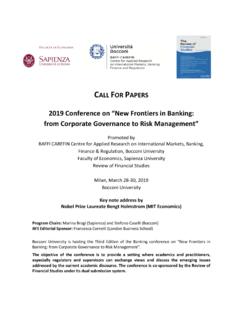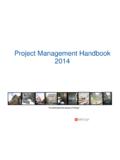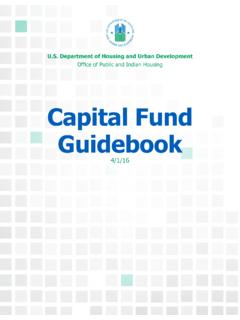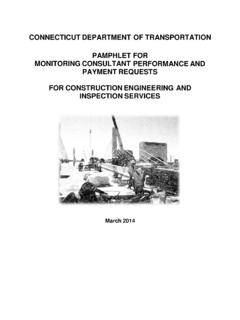Transcription of Financial Technology (FinTech): Call for Research …
1 Financial Technology ( fintech ): call for Research Proposals Sponsor: Review of Financial Studies; sponsoring editors: Itay Goldstein, Wei Jiang, and Andrew Karolyi Submission Deadline: 03/15/2017. OVERVIEW. Over the past decade, technological innovation has transformed the Financial services industry at an accelerated pace, and further disruption of the traditional Financial sector is a near certainty. To foster forward-looking and cross-disciplinary academic Research in this new area, the Review of Financial Studies (RFS) is sponsoring a novel two-stage editorial process calling for submissions on Financial Technology ( fintech ) in 2017. The process, which is closely related to a registered reports format, is designed to encourage researchers to engage in innovative Research on this new emerging topic. In the first stage, there is a call for Research proposals in which authors outline the questions they will address, the methodologies they will use, the model framework they will explore (in the case of theory work) or the data they will gather (in the case of empirical work) and in which they will offer as much detail as possible on the Research design and analyses used to interpret the results.
2 Members of a scientific committee and the RFS sponsoring editors evaluate the likelihood that the project will significantly extend our understanding of fintech to be a good fit for the RFS. Researchers of selected proposals will be invited to a workshop, to be held in New York on 05/25/2017 (tentative) to present their proposals to the scientific committee members, peer authors, and other invited experts for feedback. The organizers expect 8-10 successful proposals to receive invitations to the workshop. Accepted proposals will continue to the second stage with another conference for completed papers in late 2017 or early 2018 (location and dates to be determined), following the standard conference format. These paper presentations will describe the original intent and actual execution of the study approved in the first phase along with the results and interpretation of planned and unplanned analyses. Reviewers and editors will evaluate whether the authors have executed their planned analyses, whether these analyses conform sufficiently to the original proposal , and whether the authors' additional analyses and their interpretations are appropriate.
3 A positive evaluation along these criteria will lead to publication of the final study in the RFS. The usual standards for publication of high-quality scholarship in Finance apply and must be met. If a proposal does not successfully move past the first stage, it does not preclude the possibility that a completed paper at some point in the future could be submitted to the RFS using the normal submission process. This unconventional two-stage process is intended to encourage researchers interested in fintech to engage in innovative Research , gather new data, and think of new models in this frontier topic. The evaluation of the scope and significance of the contribution will be made early on in the first stage, and the final decision of acceptance in the second stage will mostly be based on successful execution. Hence, the usual uncertainty about a study's incremental contribution or fit to a top general-interest journal is significantly reduced after the proposal stage.
4 In addition, for empirical work, authors of the projects can undertake the risky work of data gathering without concern that their paper will be rejected simply because the data did not support their hypotheses a priori. The evaluation will be made based on the significance and scope of the proposal and its successful execution. PAPER SUBMISSION TOPICS. We currently invite the submission of Research proposals in all areas related to fintech , and we encourage inter-disciplinary studies. Topics of particular interest include, but are not limited to: Innovations in payments: peer-to-peer payments, crypto currencies, digital wallets, etc. Lending and equity investment: crowdfunding, market place lending, real estate investing. Cross-process in Financial institutions: big data analytics, alternative predictive modeling and risk management. Blockchain and distributed ledger technologies: implications for clearing, settling and trading.
5 Digital Financial advice and wealth management, such as robo-advisers. Insurance models and products: risk-sharing with per-use coverage, viability of insurance pools. Financial inclusion through Technology : access to Financial services by the low-income population outside the traditional Financial system of banks and insurance companies. New regulatory challenges imposed by the disintermediation of traditional Financial institutions. In all the topics, researchers are encouraged to analyze how fintech affects: trading volume, information asymmetry, information production, risk sharing and allocation efficiency; its real effects on the availability and cost of funding; its differentiation from as well as competition with the existing intermediaries of credit such as commercial banks, venture capital, and private equity. Other important questions include the transparency of the Financial service industry; counterparty risk and liquidity; and, how Technology can reduce agency conflicts.
6 SUBMISSIONS INSTRUCTIONS: We welcome the submission of theoretical and empirical paper proposals. Authors should submit their proposals to via the Editorial Express system by 03/15/2017. Follow the Guidelines for Initial Submissions on the RFS website and indicate that this submission is a Registered Report - fintech . The sponsoring editors will not consider proposals that are under review at other conferences or at other journals which accept proposal submissions. If authors are uncertain about whether their proposal meets this requirement, it is crucial to alert the editors and inquire before submitting the proposal to the RFS. The proposal will be prepared in two files: one with a cover page including the author names, affiliations, and acknowledgements; and, another as an anonymous copy, which does not contain author information and acknowledgements. It should include the following elements: [1] Title and topic. [2] Objectives of the study.
7 [3] Methodologies and Research design. [4] If empirical: data description, proposed tests, and key predictions. [5] If theoretical: model setup, proposed analysis, and key predictions. [6] Timeline of delivery (that fits into the two-stage process). [7] The CVs of researchers (as a supplementary appendix file). Preliminary results are not pre-requisites for a successful proposal , but they are very welcome and helpful for evaluation. Proposals will be reviewed and selected for presentation by the scientific committee. Authors whose proposals have been accepted to the workshop will be notified by 04/15/2017. SCIENTIFIC COMMITTEE: Campbell Harvey, Fuqua School of Business, Duke University Zhiguo He, Booth School of Business, University of Chicago Gerard Hoberg, Marshall School of Business, University of Southern California Shimon Kogan, Arison School of Business, IDC. Roni Michaely, Johnson Graduate School of Management, Cornell University Maureen O'Hara, Johnson Graduate School of Management, Cornell University Thomas Philippon, Stern School of Business, New York University Tarun Ramadorai, Imperial College London Matthew Spiegel, Yale School of Management Paul Tetlock, Graduate School of Business, Columbia University Stephen Zeldes, Graduate School of Business, Columbia University Xiaoyan Zhang, Krannert School of Management, Purdue University and PBC School of Finance, Tsinghua University Sponsoring RFS Editors Itay Goldstein, Wharton School, University of Pennsylvania Wei Jiang, Columbia Business School, Columbia University Andrew Karolyi, Johnson Graduate School of Management, Cornell University









